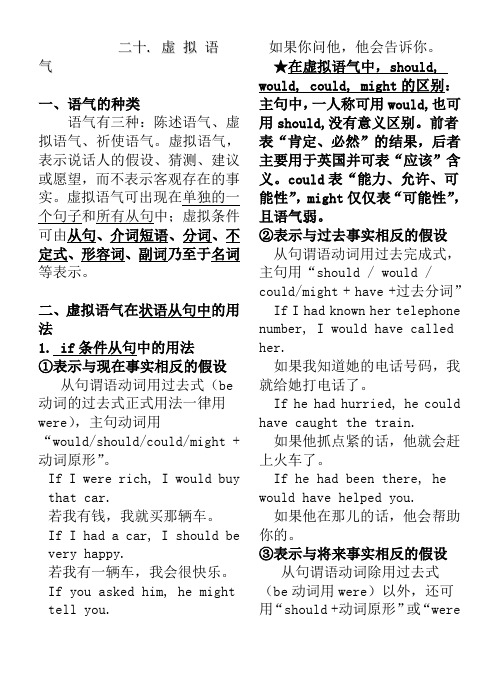虚 拟 语 气
- 格式:doc
- 大小:79.50 KB
- 文档页数:10


虚拟语气
概述:
虽然在整个语法体系中,虚拟语气所占比重不大。
但是,它却是学生理解和掌握上的一个难点。
历年高考中,单独设题考查虚拟语气的情况并不是很多。
它的考查经常是,虚拟语气与情态动词,与陈述语气的混合考查。
题型涉及完形填空,短文改错等。
思维导图:
目的状语从句
方式状语从句
让步状语从句
原因状语从句
在if only 引导的条件句
在表示愿望的感叹句中
在“what if ….”句型中
知识点梳理:
I 基本概念:
语气:语气表达的是说话者的态度问题。
通常是通过句子中的谓语动词与一些情态动词的结合,或通过自身的变化。
英语中的3种语气:
II 虚拟语气的具体用法
1. 非真实条件句
4.定语从句
用于句型:It is (high/about) time (that) + 过去式(be动词保持was, were两种形式)
+ should do (should不可省)
It is time that you went to bed.
It’s high time that we should begin the meeting.。

二十.虚拟语气一、语气的种类语气有三种:陈述语气、虚拟语气、祈使语气。
虚拟语气,表示说话人的假设、猜测、建议或愿望,而不表示客观存在的事实。
虚拟语气可出现在单独的一个句子和所有从句中;虚拟条件可由从句、介词短语、分词、不定式、形容词、副词乃至于名词等表示。
二、虚拟语气在状语从句中的用法1. if条件从句中的用法①表示与现在事实相反的假设从句谓语动词用过去式(be 动词的过去式正式用法一律用were),主句动词用“would/should/could/might +动词原形”。
If I were rich, I would buy that car.若我有钱,我就买那辆车。
If I had a car, I should be very happy.若我有一辆车,我会很快乐。
If you asked him, he might tell you.如果你问他,他会告诉你。
★在虚拟语气中,should, would, could, might的区别:主句中,一人称可用would,也可用should,没有意义区别。
前者表“肯定、必然”的结果,后者主要用于英国并可表“应该”含义。
could表“能力、允许、可能性”,might仅仅表“可能性”,且语气弱。
②表示与过去事实相反的假设从句谓语动词用过去完成式,主句用“should / would / could/might + have +过去分词” If I had known her telephone number, I would have called her.如果我知道她的电话号码,我就给她打电话了。
If he had hurried, he could have caught the train.如果他抓点紧的话,他就会赶上火车了。
If he had been there, he would have helped you.如果他在那儿的话,他会帮助你的。

状语从句中的虚构语气虚构语气在 if 指引的条从句(条件)主句(目的)件句中的用法三点:表示于此刻事实相反的If+ 主语 +动词的过去式( be 用主语 +would(shouldcould虚构条件句were)might)+ 动词原型表示与过去事实相反的If+ 主语 +had+ 动词的过去分主语 +would ( should could 拟条件句词might ) +have+动词的过去分词表示与未来事实相反的If+ 主语 +should( were to) + 主语 +would ( could should 虚构条件句动词原型 / 动词的过去式might ) +动词原型混淆条件句——主从句有时条件从句中的动作与主句中的动作,发生的时间不一致,时间不一致的状况下的这是动作的形式应依据它所表示的时间加以调整。
虚构语气有时虚构条件句并没用if从句表示出来,而是用介词短语委婉条件句( otherwise ,or ,without ,but for )上下文或其余方式来表示。
条件从句中省略 if 采纳倒装语序的状况虚拟语气在 as if/as though 指引的方式状语从句中1.条件暗含在短语中;2.条件暗含在上下文中;3.虚构式变成习惯说法,很难找出其暗含的条件。
在if 指引的表示虚构的条件状语从句中,有时能够把虚构条件中的连词 if 省去,而将 had , should , were 等助动词提到主语以前。
例:原句: If she were younger,she,would do it.去if : Were she younger,she,would do it.1.表示与此刻事实相反或对此刻状况有思疑,谓语动词用过去式。
2.表示与过去事实相反,谓语动词用过去达成时。
3.表示与未来事实相反注意: 1.在 as if/as though 句中,假如有可能成为事实,用陈说语气。
例: He looks as if he going to be ill.2.as though 或 as if 指引的状语从句,从句主语和主句主语同样时,从句中可省略主语和部分谓语。


虚拟语气分三种情况来掌握:1、虚拟条件句。
2、名词性虚拟语气。
3、虚拟语气的其他用语。
一、虚拟条件句:条件状语从句是非真实情况,在这种情况下要用虚拟语气。
1、条件从句与现在事实不一致,其句型为:If 主语+过去时,主语+should(could, would,或might)+动词原形,如:If I were you, I wouldstudyhard.If it rained, I wouldnot be here now.2、条件从句与过去事实不一致,句型为:If 主语+had+过去分词,主语+should(could, would,或might)+have+过去分词,如:If the doctor had come last night, the boy wouldhave saved.If I had not studie d hard, I wouldhave failed in the exam last term.3、条件从句与将来事实不一致,句型为:+do,主语+should(could…)+原形do过去时(与现在事实条件句一样)。
If it should rain tomorr ow, we wouldstay at home.If I were to go to the moon one day, I couldsee it with my own eyes.If you missed the film to night, you wouldfeel sorry.注意问题:1、If条件句中绝对不可出现“would”。
2、根据句中的时间状语,有时可能出现“混合虚拟”的情况,即主句可能是现在的情况,条件句也许是发生在过去的情况,但都是遵守上述句型。
3、在条件句中如果出现we re, had, should可省去if,将主语与这些词倒装,例如:Had the doctor come last night, the boy wouldhave saved.Were I to go to the moon one day, I wouldsee it with my own eyes.Should it rain tomorr ow, we wouldstay at home.二、名词性虚拟语气:在表示命令、建议要求、惊叹时的名词性从句中需用虚拟语气,基本句型:主语+(should)+动词原形,如:Mother insist ed that John go to bed at 9 o’clock.(宾语从句)We sugges ted that the meetin g should not be held.It was requir ed that the cropsshould be harves ted at once.(主语从句)The sugges tionthat he be invite d was reject ed.(同位语从句)That is theirdemand that theirwagesbe increa sed.(表语从句)注意:在这种句子中绝不出现“would”“must”“could”等。
虚拟语气【学习提示】虚拟语气在英语课文和考试中出现频繁,在学习中,对虚拟语气的学习,学生应该正确理解说话人的意图,来正确运用谓语动词的不同形式,因为虚拟语气主要是通过动词的形式表现出来的。
对虚拟语气掌握主要从以下三点来学习:a. 虚拟条件句。
b. 名词性虚拟语气。
c. 虚拟语气的其他用语。
【题海求精】1. Jean doesn't want to work right away because she thinks that if she ______ a job she probablywouldn'tbe able to see her friends very often.A. has to getB. had gotC. were to getD. could have got解析:本句的意思是:―琼不想马上就工作,她认为要是找了工作,就不能经常探访她的朋友了‖。
由此知琼目前没有工作。
该条件句应当用表示将来情况的虚拟语气。
条件从句的谓语用should或were to引出。
因此C. were to get 是本题答案。
选项A. has to get是陈述语气的现在时,不能用于虚拟条件句中。
选项B. had got是虚拟语气的过去时,不能表示将来时间。
选项D. could have got不能用于虚拟语气的条件从句中.2. Had he worked harder, he _____ the exams.A. must have got throughB. would have got throughC. would get throughD. could get through本题前半句是表示与过去事实相反的虚拟条件从句,后半句是表示与过去事实相反的主句。
相当于:If he had worked harder, he would have got through the exams.本题的答案是B. would have got through。
选项A. must have got through(一定通过了)表示一种对过去事情的主观推测,另外,must不能用在虚拟条件句中。
选项C. would get through(会通过)是虚拟语气现在时的一种表示方法,表示与现在事实相反。
选项 D. could get through(可能通过),could也可以用于非真实条件句里,表示与事实相反的情况,但这里,它只表示与现在事实或将来可能的事实相反。
3.We didn't know his telephone number; otherwise we __________ him.A. would have telephonedB. would telephoneC. must have telephonedD. had telephoned解析:结合选项可知, 全句的意思是:―我们不知道他的电话号码,否则我们会打电话给他‖。
本句中otherwise 引出的是一种与过去事实相反的假设条件,即实际上没有打电话,因此应选A. would have telephoned。
全句相当于:If we had known his telephone number, we would have telephoned him. 选项B. must have telephoned中―must + 完成式‖表示―必定……‖。
选项C. would telephone 的意思是―会打电话‖。
因为本题是讲过去发生的情况,实际上没有打电话,所以不能用would telephone。
选项D. had telephoned表示―已经打过电话‖,但本题的意思是―没有打过电话‖,所以D 不是答案。
4.The mad man was put in the soft-padded cell lest he _____ himself.A. injureB. injuredC. had injureD. would injure解析:由连接词in case, so that ,unless, lest ,for fear that引起的状语从句中,谓语动词常用虚拟形式,即should(might, would)+动词原形,这个疯子被关进墙上装有衬垫的病房,以免伤了他自己。
(答案是A)5.Look at the terrible situation I am in! if only I ____ your advice.A. followB. had followedC. would followD. have followed解析:if only 引出感叹句,意思是―要是……多好‖,表示说话人的一种愿望,希望发生(事实上不可能发生)与过去事实相反的情况。
本句的全句意思是:―看我现在的处境多糟糕!要是我听从你的劝告多好‖。
事实上,句中的―我‖没有听从劝告,所以处境很糟糕。
题中空格处应当用虚拟语气,答案是B。
6.It is politely requested by the hotel management that radios ______ after 11 o'clock at night.A. were not played C. not be playedB. not to play D. did not play解析:本题考查虚拟语气在宾语从句中的应用。
意思是:―旅馆管理部门恳请客人晚上11点后不要打开收音机‖。
句中的谓语动词request(请求)所引出的从句应当用虚拟语气,即动词原形或―should+动词原形‖。
本句的主语从句中,主语radio是谓语动词play 的客体,谓语应当用被动语态。
所以,答案是C) not be played。
在上述这类句子中不能用动词过去时形式表示虚拟语气,所以A)不正确。
选项B) not to play是动词带to的不定式,不能在句中作谓语。
选项D)did not play也是动词play的过去时形式,同样不能在本句中作为虚拟语气来使用。
而且,它是主动语态形式,而本题要用被动语态。
7.The tree looked as if it ______ for a long time.A. hasn't wateredB. didn't waterC. hadn't been wateredD. isn't watered解析:as if 后接从句时,主要根据说话者的语气判断是否要用虚拟语气。
如果说话者陈述的内容很有可能发生,就不用虚拟,反之,就要用虚拟语气。
如:Look at the dark cloud! It looks as if it is raining. 本句意思是:那棵树看上去好象很久没人给浇水了。
(答案是C)8. Without electricity human life _______ quite different today.A. isB. will beC. would have beenD. would解析:本题考查条件虚拟语气。
句意为:若是没有电,人们的生活会与现在的很不一样。
这是一种与事实不符的假设,故要用虚拟语气,介词without是含蓄条件,表结果的主句中要用对现在和将来的虚拟形式,类似介词短语but for。
所以答案为D9.I’d you______ singing now.A. stopB. stopped C to stop D. stopping解析:本题考查would rather 句型的用法,would rather 后接动词原形或从句,从句的谓语动词常用过去时(对现在的虚拟)或过去完成时(对过去的虚拟)。
10.I wish I _____ the film before.A. seeB. sawC. had seen D has seen解析:本题考查wish 宾语从句中的虚拟语气。
从句中的时间状语为before 说明此处的虚拟应是对过去不能实现的愿望,谓语动词要用过去完成时。
所以答案为C。
【知识点概要】虚拟语气分三种情况来掌握:1、虚拟条件句。
2、名词性虚拟语气。
3、虚拟语气的其他用语。
一、虚拟条件句:条件状语从句是非真实情况,在这种情况下要用虚拟语气。
1、条件从句与现在事实不一致,其句型为:If 主语+过去时,主语+should(could, would, 或might)+动词原形,如:If I were you, I would study hard.If it rained, I would not be here now.2、条件从句与过去事实不一致,句型为:If 主语+had+过去分词,主语+should(could, would, 或might)+have+过去分词,如:If the doctor had come last night, the boy would have saved.If I had not studied hard, I would have failed in the exam last term.3、条件从句与将来事实不一致,句型为:If 主语+ were to /should+do/主语+ did,主语+should(could…)+原形doIf it should rain tomorrow, we would stay at home.If I were to go to the moon one day, I could see it with my own eyes.If you missed the film to night, you would feel sorry.注意:1、If条件句中绝对不可出现“would”。
2、在条件句中如果出现were, had, should可省去if,将主语与这些词倒装,例如:Had the doctor come last night, the boy would have saved.Were I to go to the moon one day, I would see it with my own eyes.Should it rain tomorrow, we would stay at home.二、宾语从句中的虚拟语气:1 在表示命令order、建议suggest\advise\propose、要求insist\ command\ request\ demand\ require希望desire的动词后接宾语从句时需用虚拟语气,即宾语从句中: 主语+ (should) + 动词原形如:(1)The teacher suggested we (should )finish that task at the end of next week.(2)The officer ordered that the enemy (should ) be surrounded in the village before daylight. (3)His uncle insists that he (should ) go to the most well-known university instead of some common ones.2、表示愿望的动词wish后的宾语从句中,需用虚拟语气。